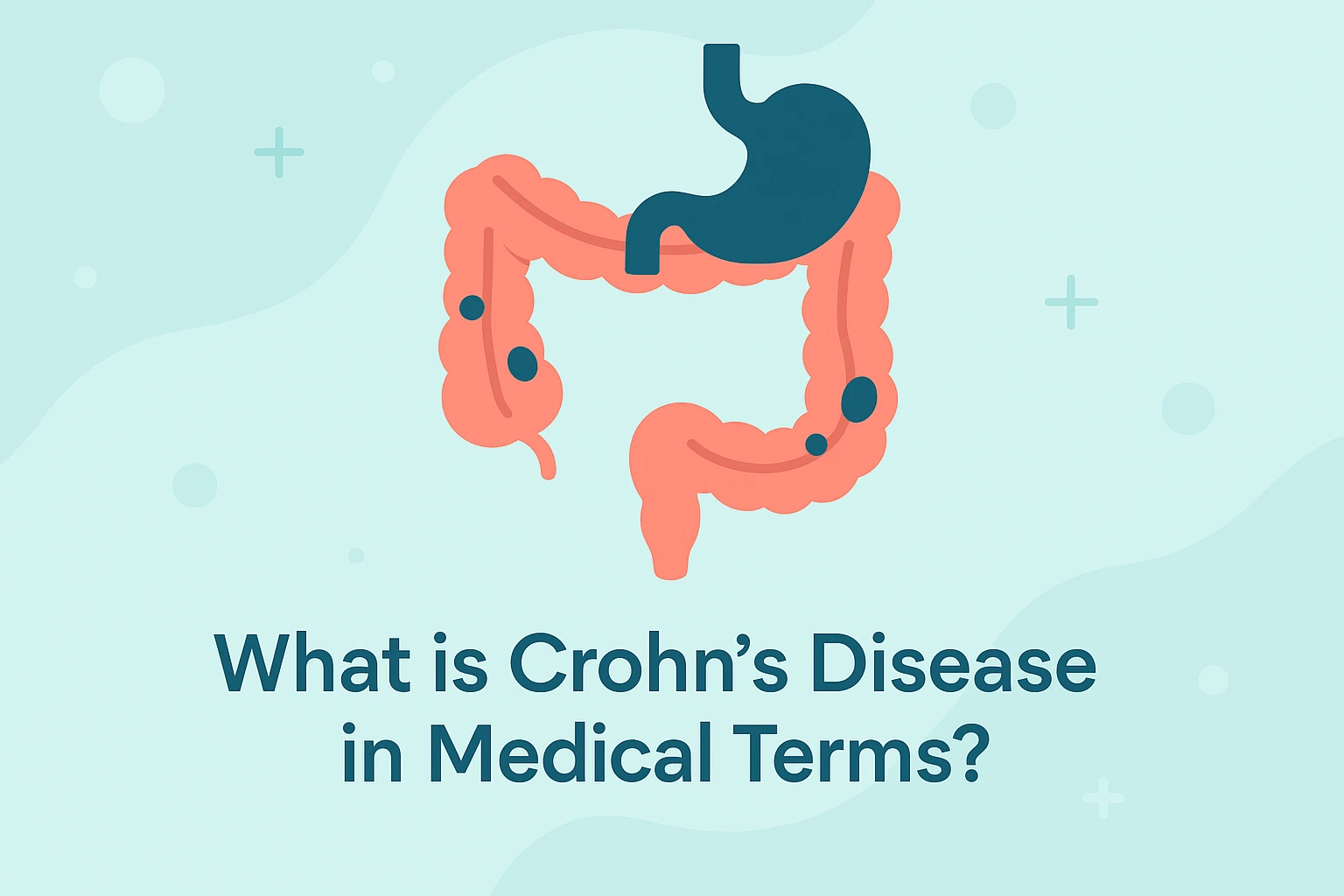Crohn’s disease is a chronic inflammatory bowel disease (IBD) that causes inflammation in the digestive tract, leading to symptoms like abdominal pain, diarrhea, fatigue, and weight loss. Unlike ulcerative colitis, another form of IBD, Crohn’s disease can affect any part of the digestive system from the mouth to the anus, but it most commonly affects the ileum (the last part of the small intestine) and the colon. The exact cause of Crohn’s disease is not well understood, but it is believed to involve a combination of genetic, environmental, and immune system factors.

Causes and Risk Factors of Crohn’s Disease
The cause of Crohn’s disease is not fully known, but several factors are thought to contribute to its development:
- Genetics: A family history of Crohn’s disease or other IBD conditions increases the likelihood of developing the disease. Specific gene mutations related to the immune system have been linked to Crohn’s.
- Immune system dysfunction: In Crohn’s disease, the immune system mistakenly attacks healthy cells in the digestive tract, causing chronic inflammation.
- Environmental factors: Dietary habits, smoking, and stress can trigger or worsen the condition. The disease is more prevalent in developed countries and urban environments, possibly due to lifestyle factors.
- Infections: While not a direct cause, certain infections may trigger or exacerbate Crohn’s disease in genetically predisposed individuals.
Symptoms of Crohn’s Disease
The symptoms of Crohn’s disease can vary significantly from person to person and depend on the severity and location of the inflammation. Common symptoms include:
- Abdominal pain and cramping, often in the lower right side of the abdomen.
- Chronic diarrhea, sometimes with blood or mucus.
- Fatigue and a general feeling of being unwell.
- Weight loss and poor appetite, often due to malabsorption of nutrients.
- Fever or a low-grade fever during active disease flare-ups.
- Mouth sores, skin rashes, or joint pain (extra-intestinal manifestations).
- Rectal bleeding or the formation of fistulas (abnormal connections between the intestine and other organs or the skin).
Diagnosis and Treatment for Crohn’s Disease
Diagnosing Crohn’s disease usually involves a combination of medical history, physical examination, and diagnostic tests, including:
- Colonoscopy: A procedure to examine the inside of the colon and take tissue samples (biopsy) for testing.
- Endoscopy: A procedure to view the small intestine and take samples for biopsy.
- Imaging tests: CT scans or MRI scans can provide detailed images of the intestines, revealing areas of inflammation or damage.
- Blood tests: To check for signs of infection or inflammation.
Treatment for Crohn’s disease focuses on reducing inflammation, managing symptoms, and preventing complications. Common treatments include:
Medications:
- Aminosalicylates (5-ASAs): Anti-inflammatory drugs used to reduce inflammation in the intestines.
- Corticosteroids: Used for short-term flare-ups to control severe inflammation.
- Immunosuppressants: Drugs like azathioprine and methotrexate to suppress the overactive immune system.
- Biologic therapies: TNF inhibitors like infliximab or adalimumab are used to target specific molecules involved in the inflammation process.
Surgery: In some cases, surgery may be necessary to remove damaged parts of the intestine or to address complications like obstructions, fistulas, or abscesses.
Nutritional support: Since Crohn’s disease can lead to malabsorption of nutrients, patients may require specialized diets or nutritional supplements.
Prevention and Management:
While Crohn’s disease cannot be prevented, its symptoms can be managed and flare-ups minimized through the following strategies:
- Dietary modifications: Avoiding trigger foods, such as those high in fiber or fat, and eating smaller, more frequent meals may help.
- Stress management: Techniques such as meditation, yoga, or counseling can help reduce the impact of stress, which can trigger flare-ups.
- Smoking cessation: Smoking exacerbates Crohn’s disease, so quitting smoking is crucial in managing the condition.
- Regular monitoring: Ongoing monitoring through regular check-ups and testing can help detect flare-ups early and adjust treatment as needed.
When to Seek Medical Help for Crohn’s Disease?
If you experience symptoms such as persistent abdominal pain, chronic diarrhea, unexplained weight loss, or blood in the stool, it’s important to consult a healthcare provider. Early diagnosis and intervention can help manage the disease and prevent complications.
Related Terms to Crohn’s Disease
FAQs for Crohn’s Disease
When should I go to the ER for crohn’s disease?
If you experience severe symptoms like fainting, chest pain, or confusion, seek emergency care immediately.
How can heat and dehydration affect crohn’s disease?
In hot climates, dehydration can exacerbate symptoms, especially during long-haul travel or fasting.
What are some ways to reduce the risk of crohn’s disease flare-ups?
Maintaining a balanced diet and avoiding known triggers can help manage symptoms.
